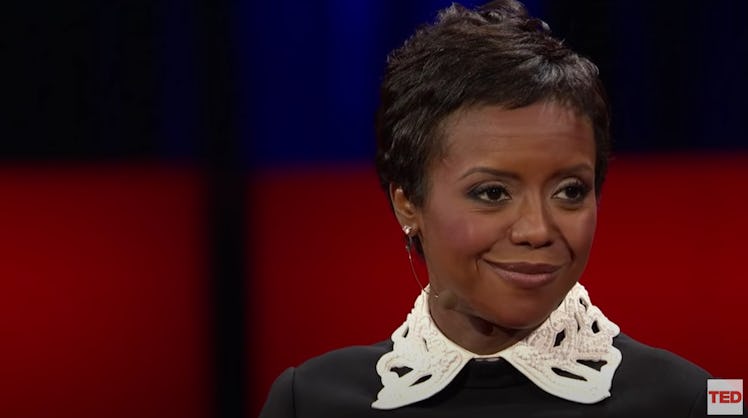
8 TED Talks About Racism To Help Further Your Education
Education is a key component to dismantling years of systemic racism in the U.S., and learning about racism from members of the Black community — who are uniquely qualified to speak, write, and educate on the subject — is crucial. There are so many ways to get information: books, documentaries, and podcasts are all popular platforms for these topics. But if you're looking for even more resources to aid in learning about the oppression and injustices faced by so many people in the U.S., these TED talks about racism, bigotry, and the country's Black history are another great place to seek more knowledge.
The TED website has a curated list of enlightening talks centered around race and racism against Black people. "From passionate pleas for reform to poetic turns of phrase, these talks take an honest look at everyday realities of Black Americans and illuminate the way forward," the introduction to the list explains.
The below is a selection of nine TED Talks from the website's collection that can further your knowledge and help you take the next steps in anti-racism education and activism. But this is just a small selection of powerful, informative Talks out there; check out the website for even more.
Further, check out the roundups of anti-racism resources on other platforms, including podcasts about race and injustice in the U.S., movies that tackle systemic racism, and documentaries about race in the U.S.
01"Why It's So Hard To Talk About The N-word"
Elizabeth Stordeur Pryor, a historian and professor of U.S. history, talks about her personal experiences with the N-word. Using her own encounters, she discusses her journey of reckoning with the isolating slur and how people can foster productive conversations surrounding the slur.
If you had more questions after the conversations surrounding Hannah Brown's use of the N-word during an Instagram Live, this is the Talk for you.
02"The Symbols Of Systemic Racism"
(Warning: This Talk contains graphic images.)
Paul Rucker, a multidisciplinary artist and TED Fellow, is a collector of slavery artifacts including branding irons, shackles, and postcards depicting lynchings. In his Talk, Rucker recounts his desire to add a Ku Klux Klan robe to his collection, but explains couldn't find an undamaged one.
"What is a Black man to do in America when he can't find the quality of Klan robe that he's looking for?" he asks the audience. His solution was to make robes in non-traditional fabrics to illustrate the normalcy of systemic racism in the U.S., and how by acknowledging it, people can start to eliminate it.
03"The Real Story Of Rosa Parks"
In this Talk, African-American studies professor David Ikard discusses how history whitewashed the story of Rosa Parks. Ikard highlights how harmful it is to water down history in order to make it more digestible, and how important accuracy is in order to stop the spread of racism. Filled with tons of backstory on Parks, this insightful Talk illuminates just how much white fragility has to do with altering history.
04How To Deconstruct Racism, One Headline At A time"
If you're looking for some laughs while learning, Baratunde Thurston (writer for The Daily Show and The Onion) digs into the detrimental habit white Americans have of calling the police on innocent Black people. Using the power of language and a personal story about getting pulled over by the cops, Thurston urges his audience to check their privilege, and their language.
05"Color Blind Or Color Brave?"
Finance executive Mellody Hobson discusses why talking about race is such a taboo, and why that makes it even more important to talk about. In her moving presentation, Hobson explains how these discussions, though shocking, will lead to better economic and humanitarian grown: "The first step toward solving a problem is not hiding it."
06"How To Raise A Black Son In America"
Poet Clint Smith's moving piece about growing up highlights how Black children are taught to avoid murder from a young age. Recalling the time his father caught him playing with water guns with his white friends after dark, Smith discusses the fears of Black parents and why Black Lives Matter is the difference between life and death.
07"The Little Problem I Had Renting A House"
In a powerful story about "everyday racism," James A. White Sr. discusses the struggles he went through to find a place for his young family to live after joining the U.S. Air Force. Small interactions that indicated a bigger problem are the foundation of this dialogue. White explains how this sort of bigotry creates ripples, and how, as a result, he's had to teach his grandchildren to interact with law enforcement.
08"How To Overcome Our Biases? Walk Boldly Toward Them"
In addressing how subconscious attitudes influence life-threatening racism, diversity advocate Vernā Myers asks society to acknowledge their biases and then move toward the groups that make them uncomfortable. According to Myers, when a person figures out what their biases are, they can learn to break them down. She also speaks about the implicit association test, which can help people discover their own biases so they can work toward unlearning them.
This article was originally published on